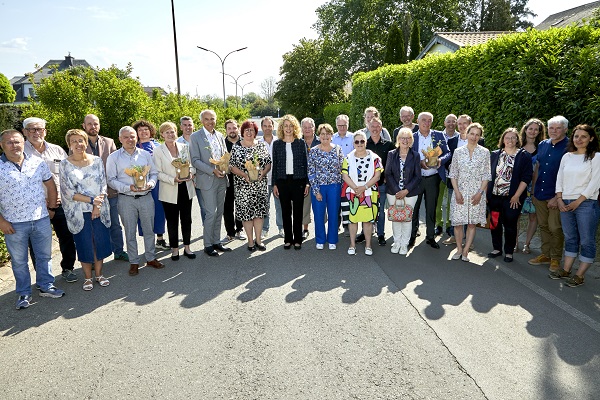 Group photo with Luxembourg's Minister of the Environment, Climate and Sustainable Development, Joëlle Welfring (centre) and representants of the winning municipalities Sanem, Strassen, Mondorf-les-Bains, Ettelbruck, Dudelange;
Credit: Studion Photography
Group photo with Luxembourg's Minister of the Environment, Climate and Sustainable Development, Joëlle Welfring (centre) and representants of the winning municipalities Sanem, Strassen, Mondorf-les-Bains, Ettelbruck, Dudelange;
Credit: Studion Photography
Luxembourg's Ministry of the Environment, Climate and Sustainable Development have named the five municipalities that were awarded as part of the call for projects for more nature in Luxembourg's cities and villages ("Méi Natur an eise Stied an Dierfer").
This project aimed to demineralise sealed spaces and re-vegetate them in order to create more space for green infrastructures.
"The municipalities fully play their role as role models. I am convinced that these projects have a real added value for biodiversity and adaptation to climate change, but that, above all, they will represent a clear improvement in the residents’ quality of life,” said Luxembourg's Minister of the Environment, Climate and Sustainable Development, Joëlle Welfring.
The call for projects was launched in December 2022, and aimed to encourage Luxembourg’s municipalities to apply a green policy to the urban spaces thus favouring the redevelopment of public places or areas around schools. Among these measures, some included the demineralisation of surfaces to be replaced with grass, trees, shrubs or permeable coverings.
According to the ministry, this greening of urban spaces leads to better water retention and a lowering the temperatures in towns and villages, and is a measure to tackle climate change. The recent climatic events in Luxembourg, notably the drought in 2022, the torrential rains and floods in 2021, to name a few examples, show that Luxembourg is not spared by the effects of climate change. Thus, the ministry stressed the importance of supporting the municipalities in their commitment to adapt to change using nature-based solutions.
On the occasion of the call for projects of the Ministry of the Environment, Climate and Sustainable Development, twelve municipalities have responded and submitted concrete projects for greening the urban space on their territory.
A jury composed of a representative of the municipal sector (named by SYVICOL), of two expert representatives in the domains of urbanism and landscape design (named by the Ordre des Architectes et des Ingénieurs-Conseils - OAI), one representative of the ecological movement and a representative of the Ministry of the Environment, Climate and Sustainable Development. The jury selected five projects that will benefit from financial support from the climate fund and the Environment Ministry.
The project of the municipality of Sanem received the best jury evaluation. This project aims to remodel Avenue 2000 in Soleuvre and demineralise a currently drivable street to transform it into a green space for the neighbourhood’s inhabitants. The municipality plans to create ecological connectivity between the current Fenkelbierg park and the wooded area near Ehlerange. The expressed desire to involve the inhabitants in the finalisation of this greening project considering its use and layout motivated the jury to award the municipality of Sanem first place.
"Sustainability can only be created together, and step by step. By creating a green space on this stretch of road, which stores water with new vegetation, cools the air and guarantees biodiversity, we offer humans and animals a new kind of avenue that breathes life through everyone’s participation," said Simone Asselborn-Bintz, Mayor of the municipality of Sanem.
Four other municipalities were also rewarded and will benefit from a subsidy from the ministry for the realisation of their projects.
Ranked second in the evaluation of the jury, the municipality of Strassen plans to demineralise an existing parking lot and thus create a more pleasant area for residents and people working in this neighbourhood.
The municipality of Mondorf-les-Bains was awarded third place thanks to a redevelopment project for the town square Jumelées which is meant to become a shared space and transform into a “sponge” area. The “sponge city” is a concept that has as an objective the absorption of rainwater into the soil, thereby contributing to a better regulation of flooding, making cities more resilient to the effects of climate change.
The projects of the municipalities of Ettelbruck and Dudelange were also rewarded, in joint fourth place. While Ettelbruck plans to replace part of the paved parking lot at the "Däichwisen" with green and permeable surfaces, the city of Dudelange plans to redevelop the Stutzenhof schoolyard by demineralising more than half of the surface and replacing it with green spaces dedicated to school students.
As part of the “Naturpakt”, this call to projects is based on “nature-based solutions” and aims to increase Luxembourg’s resilience to climate change, independently of future climatic events. The greening of towns and villages is an important lever allowing on the one hand to store water and thus to better protect people and infrastructure in the event of storms or of floods, the ministry noted.
On the other hand, according to the ministry, in the event of the opposite phenomenon, namely periods of drought and heatwaves, green spaces contribute to the fight against islands of heat. Added to these microclimatic benefits are a multitude benefits such as improved air quality, preservation and promotion of biodiversity in urban areas and more generally a gain in the quality of life for citizens.
Minister Welfring announced that other calls for similar projects will be launched in future.








